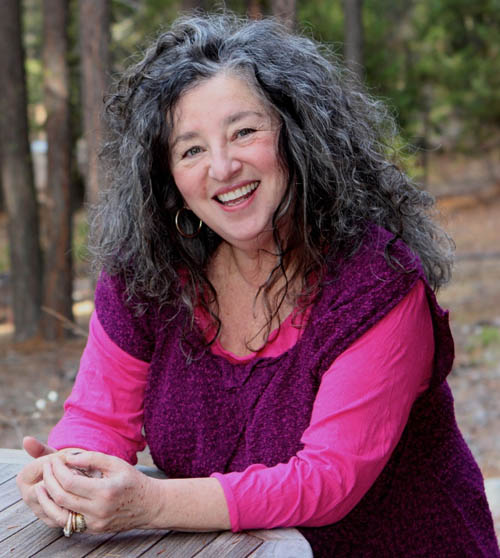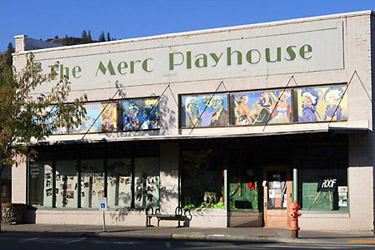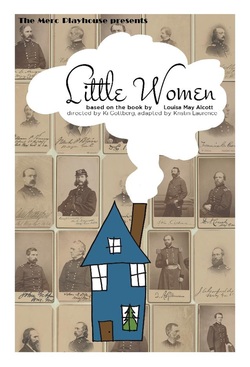home | internet service | web design | business directory | bulletin board | advertise | events calendar | contact | weather | cams

|
Community Place While waiting tables at the Oyster Grotto restaurant on Sandpoint Way in Seattle in 1976, Ki Gottberg had an unusual compliment from a diner she was serving. He said he liked her voice.  Merc Playhouse artistic director Ki Gottberg. Merc Playhouse artistic director Ki Gottberg.The man told her she should be doing voice-overs. This happened to be advice from someone who knew what he was talking about: the king of voice-overs, Mel Blanc, best known as the voice of Bugs Bunny, Porky Pig, Daffy Duck and the whole pantheon of the “Looney Tunes” cartoon characters. Blanc put her in touch with an agency, and that launched the aspiring actor on an unanticipated career. “I was the voice of the Bon Marche for eight years,” she says. She also did voice-over work for such companies as Holland American Cruise Lines, Alaska Airlines and McDonald’s. Today Gottberg, 61, is launched on another unanticipated career: artistic director of the Merc Playhouse in Twisp. “This just seems to be too good to be true,” she says of the unexpected opportunity to direct at the Merc. She will also continue to teach at Seattle University, where she has taught drama, acting and playwriting for 27 years. Even though she and her husband Marty Cole have owned a ski cabin in Mazama for five years, Gottberg says she hadn’t attended a performance at the Merc and didn’t know about the job opening until someone in her department at Seattle University told her about it. The SU job also was something of an unanticipated career move, she says. She initially was invited to teach part time at a moment when she was stressing, as most freelancing actors do, about how to earn enough money to pay the bills. Over time she became more interested in playwriting, she says, and this dovetailed better with a teaching career than with the time demands on an actor. “I realized I can’t act if I’m teaching,” she says. Her plays have been performed not only at Seattle’s New City Theatre but in San Francisco, New York and Los Angeles. She produces one play each year at SU with her student actors, whom she hopes to bring to Twisp to perform on a regular basis so they can be exposed to community theatre. The first performance, one night only, of SU theatre students at the Merc will be on Sunday, Feb. 23 at 6 p.m. in Moliere’s “The Imaginary Invalid”. That performance will be free to high school students, according to Gottberg, who says she hopes to entice students at Liberty Bell High School, which offers no theatre classes, to become interested in theatre by seeing plays at the Merc. She also hopes to have the SU students meet with interested Liberty Bell students the following Monday.  The Merc Playhouse in Twisp is now a community theatre. Ki Gottberg would like to develop a local pool of actors and directors to do productions there. The Merc Playhouse in Twisp is now a community theatre. Ki Gottberg would like to develop a local pool of actors and directors to do productions there.Since the Merc is now a community rather than professional theatre, Gottberg says it’s important for individuals in the community to make suggestions for plays they’d like to see performed and to get involved in helping mount the productions —whether it be acting (more men wanted!), fundraising or assisting with all the behind-the-scenes effort it takes to produce a play. Gottberg says she’s pleased that the Merc is debt free, which is highly unusual even for professional theaters. She stresses that she wants the Merc to be a “sustainable” operation. To that end she wants to develop a local pool of actors and directors and to reduce the production schedule to three major plays a year - one in summer, one during the fall holiday season and a children’s theatre production. Next summer, she plans to put on Shakespeare’s “Twelfth Night”. She’s also pondering putting a “Community Choice” production into the mix. “I’m interested in what people in the community think is worthy of their time.” “The rehearsal schedule for a show is just brutal,” explains Gottberg, requiring some 100 hours of time, and that’s before the sound and light people come in. “Little Women,” for example, which opens Dec. 6, will have been in rehearsal since the beginning of October for three hours every Friday, six hours every Saturday, and three to six hours every Sunday, says Gottberg. Initially, Gottberg says she thought she wanted to be a visual artist but she found studio work lonely. She was drawn to acting by the shared effort of people working together to produce an experience that other people would share. “I loved being in rehearsal,” she laughs. She was influenced by Bertolt Brecht’s plays because he “upsets and galvanizes” the audience, she adds, and she’s intrigued by how playwrights portray “the social and political” aspects of life.  The Merc will be presenting Little Women December 6-22. Image courtesy of the Merc Playhouse. The Merc will be presenting Little Women December 6-22. Image courtesy of the Merc Playhouse.“Movies make people passive,” says Gottberg, who adds that she likes walking down the streets of Twisp and not seeing a movie theatre anywhere. Before she settled on theatre studies, Gottberg spent a year living in Germany among relatives, one of whom was a Marxist who was leafletting Turkish women in German factories about the exploitative evils of capitalism. She spent another year living in Japan in a Utopian commune. She says both of these experiences broadened her outlook and made her think about “how can people live together to make a better world.” With an undergraduate degree from Fairhaven College in Bellingham, Gottberg was admitted to the University of Washington’s 16-student, three-year graduate program for theatre students. “I was the least experienced and the oldest person they ever took but it was like heaven for me,” she recalls. The other students took off for New York City or Los Angeles after graduation, but she wanted to stay in Seattle. Awarded a National Endowment for the Arts Playwright Residency, she also won the 2009 Seattle Times’ Footlights Award for a very personal one-woman show called “Frontier: Valley of the Shadow”. Gottberg’s father was a German Jew who fled Hitler’s Germany for India. The day he arrived there, Britain declared war on Germany. He was arrested and interned in India as a German national for six years. After the war he married an Indian woman who was half British. Because of the prejudice against her, “My mother didn’t like India,” says Gottberg. “She wasn’t English and she wasn’t Indian.” She belonged to a special caste of people who “felt that they had been abandoned by the people who made them.” Her parents emigrated to California, where Gottberg was born and lived for the first six months of her life. Then the family moved to Seattle, where Gottberg grew up, married and had a daughter, Vava, now 18, who got cancer at the age of 12. These are the elements of the family story Gottberg weaves into “Frontier: Valley of the Shadow”. Gottberg says she’s interested in the history of the Methow Valley and thinks there may be possibilities for producing plays based on historical material written by local residents who have family stories to tell that show what life was like here. She likens it to “an oral history of the valley” that keeps the past from being forgotten. Says Gottberg: “I’m hoping the Merc can be a place for the whole community.” 11/26/2013 Comments
|